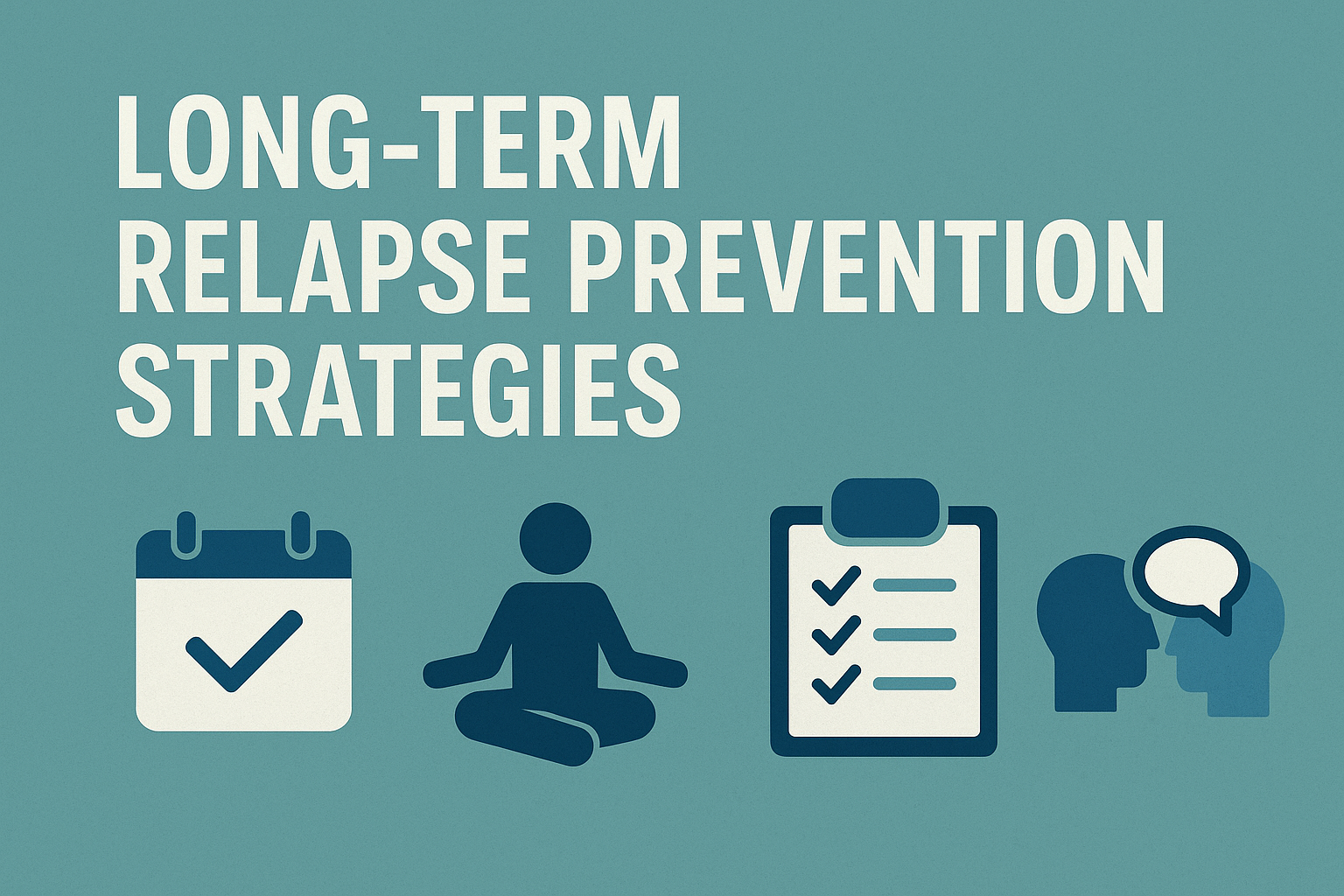Long-Term Relapse Prevention Strategies
Staying Strong After Recovery
Although finishing a rehabilitation program is a significant accomplishment, the journey doesn’t end there. Recovery is a continuous process, and there may be obstacles as well as advancements along the way. The possibility of relapse—a return to substance use following a time of abstinence—is one of the main worries following treatment.
However, relapse is not a sign of failure. It frequently indicates that in order to improve rehabilitation, new instruments, plans, and support networks are required. This blog explores tried-and-true long-term relapse prevention techniques that support people in thriving rather than just being sober.

Understanding Relapse: It’s a Process, Not an Event
Relapse doesn’t happen overnight. It usually unfolds in three stages:
Emotional relapse – Bottling up emotions, isolating, skipping self-care
Mental relapse – Romanticizing past use, craving, thinking “just once won’t hurt”
Physical relapse – Actually using the substance
Recognizing the early warning signs can help someone take action before reaching that final stage.
Long-Term Relapse Prevention Plan:
1. Create a Personalized Relapse Prevention Plan
Work with a counselor or sponsor to develop a written plan that outlines:
Triggers (stress, people, places)
Coping strategies
Emergency contacts
Support meetings
This plan becomes your go-to roadmap when times get tough.
2. Build a Support Network
Recovery isn’t a solo journey. Surround yourself with:
Trusted family and friends
Support groups like AA/NA or SMART Recovery
A sponsor or mentor in recovery
Regular check-ins keep you grounded and accountable.
3. Practice Daily Self-Care
Your physical and mental health play a massive role in staying sober. Prioritize:
Sleep – Aim for 7–8 hours
Exercise – Boosts mood and reduces cravings
Nutrition – Eat balanced meals that support brain health
Mindfulness – Yoga, meditation, or deep breathing
Self-care isn’t selfish—it’s essential.
4. Avoid High-Risk Situations
If you know certain places, people, or times of year are tempting, avoid them—especially in the early stages of recovery.
Have an “exit plan” if you ever find yourself in a risky situation (e.g., social gatherings with alcohol).
5. Identify and Manage Triggers
Learn your emotional and environmental triggers, such as:
Stress
Loneliness
Relationship conflict
Financial issues
Develop healthy coping tools like journaling, calling a friend, or seeing a therapist.

6. Develop Healthy Routines
Structure helps reduce chaos and impulsive behavior. Plan your days around:
Work or volunteering
Meetings and therapy
Hobbies and interests
Time with supportive people
A consistent routine brings stability and purpose.
7. Continue Therapy or Counseling
Ongoing therapy—individual, group, or family-based—helps you:
Process unresolved trauma
Strengthen coping skills
Address co-occurring mental health conditions
Remember: recovery is mental, emotional, and spiritual.
8. Celebrate Milestones
Recovery is worth celebrating. Whether it’s 30 days, 6 months, or 5 years, take time to:
Reflect on your journey
Reward yourself (sober celebrations, gifts, small trips)
Share your success to inspire others
9. Help Others in Recovery
One of the best ways to stay strong is to give back. Sponsor someone. Volunteer. Share your story. Helping others keeps your recovery meaningful and reminds you how far you’ve come.
10. Accept That Setbacks Happen
If relapse occurs, don’t give up. Get support immediately, review your relapse plan, and learn from the experience. Many people relapse and still go on to live full, sober lives.
De-Addiction Treatment
- In this program The patient gains confidence and strength to face Life’s Challenges.
Individual Counselling
- The Program provides one to one counselling to make the patient in a comfortable environment.
Dual Diagnosis Treatment
- People who suffer from mental illness with drug or alcohol addiction are came under this program.
Changing Life Wellness Centre Delhi – A Path to New Life.
It needs self-awareness, support, and constant work to stay sober. However, there are also significant benefits, such as mental calm, rekindled connections, and a feeling of direction.
Our center provides specialized counseling, support groups, relapse prevention classes, and aftercare programs to help you or a loved one navigate life after recovery.
We are here to support you at every turn, so you don’t have to travel this path alone.
OUR ADDICTION EXPERTS ARE WAITING
Need help building a relapse prevention plan? Contact our team for personalized support and resources. Call us today or visit our centre to begin your next chapter in recovery.



